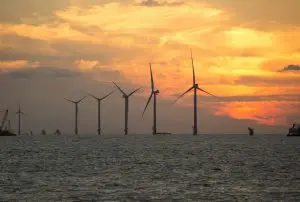After several weeks of reported delays, disagreements and leaks, the Government has finally published its plan to address the crisis in the energy sector; moving the UK away from any reliance on Russian gas and strengthening the domestic energy security.[1]
Crucially, the Energy Security Strategy provides us with an insight into the main influences and influencers of this Government. With the next general election a mere two years away, the Prime Minister appears to be moving away from the climate focus seen at COP26. Instead focusing on internal party politics and maintaining support within the Conservative . Below, Brevia has unpacked some of the telling signs of what is currently influencing Government direction on energy policy.
COP26 is long gone
Gone are the days when the words ‘climate change’ could be seen featuring heavily throughout Government press releases and strategy documents. In fact, the words climate change only feature once throughout the Energy Strategy document.
In a break from what was seen at COP26, the UK’s decision to move forward with a new licensing round for North Sea oil and gas exploration seemingly puts it at odds with the UN: Only three days ago, the Intergovernmental Panel on Climate Change (IPCC) published its latest report on mitigating climate change. In it, the IPCC made clear that there are already more fossil fuel projects than the climate can handle. It also unequivocally stated that no further projects should go ahead.[2] Although the Energy Strategy does recognise the need move away from fossil fuels, the policy of allowing new fossil fuel licenses still departs substantially from the UN’s messaging on tackling climate change.
It’s all about domestic content
Whilst the narrative on tackling climate change is being sidelined, there is an increasing emphasis on strengthening ‘home-grown’ power. This is not necessarily new. However, the Russian invasion of Ukraine, as well as the state of global energy markets, has resulted in an even stronger rhetoric on the importance of achieving ‘energy independence.’ This has dovetailed with the role energy independence can play in developing local supply chains and local content. The emphasis on developing ‘home-grown’ power can be seen throughout the Strategy. For example, through the inclusion of the word ‘British’ in the Strategy’s main title, as well as naming the new nuclear body ‘Great British Nuclear’.
Internal tensions
The clashes between the Department for Business, Energy and Industrial Strategy (BEIS) and the Treasury over spending commitments in the Strategy are no secret.[3] Speaking yesterday in the House of Lords, BEIS Minister Lord Callanan admitted that he would have liked to see more action on home insultation. He explicitly stated, however, that ‘the Treasury would not support it’.[4]
Equally though, it is not surprising that the Prime Minister was willing to take a backseat in this debate. In doing so, he was able to avoid further pressure on the public finances, whilst also allowing the blame to fall firmly on the Chancellor for lack of further action (see news headings such as ‘Rishi Sunak blocks green homes plan that would have lowered energy bills’).[5] The tensions between the Chancellor and the Prime Minister are equally no secret,[6] and a hit to the Chancellor’s popularity is not the worst outcome for the Prime Minister. Particularly as the Conservative party deliberates on who is best placed to lead it into the next General Election.
Party politics
The commitment to review shale gas exploration, alongside the lack of any meaningful commitments or targets for onshore wind, shows that the Prime Minister is not willing to strain his relationship with those on the right of the Conservative party.
Leaked documents obtained by the i newspaper show that the Government backtracked on the initial proposals for 30GW onshore wind. This allegedly followed the widely reported opposition to this from both back and frontbench Conservative MPs.[7] Onshore wind was reduced from a target of 30GW by 2030 to a commitment to consult on ‘developing local partnerships for a limited number of supportive communities’. Conversely, shale gas exploration went from being considered an industry of little potential in the UK (see the Business Secretary of State’s comments back in early March),[8] to the Government commissioning a further review on whether there have been any ‘further scientific updates’ on the seismic impact of fracking. Whilst this is unlikely to amount to much, it is telling of just how much influence this section of the Conservative party holds at present.
Looking ahead
Businesses and campaigners operating within the energy industry will need to take note of the changing power dynamics in Government and how this is playing out on Government priorities. The current message from Government is clear: The emphasis is on Made in Britain. Both in terms of energy independence and the associated jobs that the Government wishes to see created from that. Those wishing to have any meaningful engagement with the Government would be wise to keep that in mind. Only by doing so can they ensure desired policy outcomes.
BREVIA CONSULTING PROVIDES STRAIGHTFORWARD POLITICAL AND COMMUNICATIONS SUPPORT TO BUSINESSES AND ORGANISATIONS.
Discover how Brevia can help you and your organisation by contacting the Brevia Energy Team on 020 7091 1650 or emailing us at: contact@brevia.co.uk.
Notes
[1] Department for Business, Energy and Industrial Strategy, ‘British Energy Security Strategy’, 7 April 2022, Link
[2] UN Intergovernmental Panel on Climate Change (IPCC), ‘Climate Change 2022: Mitigation of Climate Change’, 4 April 2022, Link
[3] Rob Davies and Rowena Mason, ‘PM to put nuclear power at heart of UK’s energy strategy’, 6 April 2022, Link
[4] Lord Callanan, House of Lords Hansard, 7 April 2022, Vol.820, Col.2199, Link
[5] Ben Riley-Smith, The Telegraph, ‘Rishi Sunak blocks green homes plan that would have lowered energy bills’, 5 April 2022, Link
[6] George Parker and Chris Giles, The FT, ‘Tensions rise as Sunak and Johnson prepare for autumn spending tussle’, 6 August 2021, Link
[7] Richard Vaughan, Paul Waugh, The I, ‘Boris Johnson plans vast nuclear energy expansion but waters down onshore wind ambitions’, 6 April 2022, Link
[8] The Rt Hon Kwasi Kwarteng MP, Daily Mail, ‘Switch to our own power supplies is a win-win for everyone – except Putin’, 6 March 2022, Link




